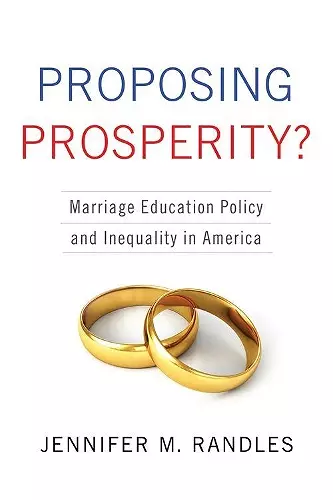Proposing Prosperity?
Marriage Education Policy and Inequality in America
Format:Hardback
Publisher:Columbia University Press
Published:24th Jan '17
Currently unavailable, and unfortunately no date known when it will be back

"Fragile families"-unmarried parents who struggle emotionally and financially-are one of the primary targets of the Healthy Marriage Initiative, a federal policy that has funded marriage education programs in nearly every state. These programs, which encourage marriage by teaching relationship skills, are predicated on the hope that married couples can provide a more emotionally and financially stable home for their children. Healthy marriage policy promotes a pro-marriage culture in which two-parent married families are considered the healthiest. It also assumes that marriage can be a socioeconomic survival mechanism for low-income families, and an engine of upward mobility. Through interviews with couples and her own observations and participation in marriage education courses, Jennifer M. Randles challenges these assumptions and critically examines the effects of such classes on participants. She takes the reader inside healthy marriage classrooms to reveal how their curricula are reflections of broader issues of culture, gender, governance, and social inequality. In analyzing the implementation of healthy marriage policy, Randles questions whether it should target individual behavior or the social and economic context of that behavior. The most valuable approach, she concludes, will not be grounded in notions of middle-class marriage culture. Instead, it will reflect the fundamental premise that love and commitment thrive most within the context of social and economic opportunity.
A useful, policy-relevant, and balanced treatment of how government-funded marriage and relationship education really works on the ground. -- Shawn Fremstad, Senior Fellow, Center for American Progress The growing income gap in America has brought with it a marriage gap. Children are born at every class level but increasingly the rich marry and the poor don't. In 2002 President Bush set up the Healthy Marriage Initiative to teach poor unmarried parents to show empathy, listen actively, avoid violence, and marry. Participants loved and learned from the program, but discovered in its underlying ideology a focus on choice (to be or not to be nice to your partner) and silence about options (to get useful training and well paid work). In this beautifully researched, wise, important book, Randles tackles one of America's most important dilemmas and points to urgently needed solutions. -- Arlie Hochschild, author of The Second Shift and Strangers in Their Own Land This monograph is a must read for a sophisticated analysis of America's attempt to promote marriage as a poverty reduction strategy. With in-depth ethnographic research and smart theoretical arguments, Randles shows that the classes themselves were often operationalized differently than policymakers had intended. But in the end, even improved relationships have to contend with the lack of jobs and opportunities, which are the root cause of poverty. -- Barbara J. Risman, professor of sociology, University of Illinois at Chicago Jennifer Randles's Proposing Prosperity is crucial reading for scholars of family and social policy. She combines essential policy background with ethnography of marriage promotion classes that just might help "true believers" recognize what is sorely missing from these seemingly kind-hearted projects. Bonus: Her clear and vivid text means my college students in family and social policy classes will read it this year. -- Virginia Rutter, co-editor, Families as They Really Are An eye-opening account of what federal marriage education programs look like on the ground and why they have been so ineffective in their goal of strengthening marriage. A well-researched and highly useful book. -- Andrew Cherlin, Johns Hopkins University Randles's astute interviews and observations reveal why, despite good intentions on all sides, classes designed to 'improve' the relationship skills of low-income couples fail to address their real-life barriers to intimacy and stability. An incisive, compassionate, and engrossing work. -- Stephanie Coontz, author, Marriage, A History: How Love Conquered Marriage In this important and valuable book, Jennifer Randles immerses herself in state-run relationship classes, and shows they teach more about the politics and ideology of marriage promotion than about solving the pressing problems poor families face. She exposes the irony that, although relationship skills training may be useful, it won't address the problems of family inequality. -- Philip Cohen, University of Maryland
ISBN: 9780231170307
Dimensions: unknown
Weight: unknown
280 pages